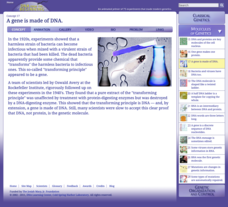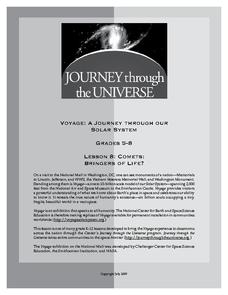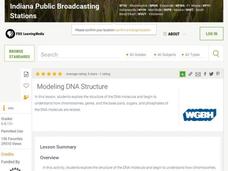Chicago Botanic Garden
Are All Plants Created Equal?
Photosynthesis requires energy and produces food, and cellular respiration produces energy and requires food. An interesting lesson analyzes the factors that affect the rates of photosynthesis and respiration. Classes spend one day...
Chicago Botanic Garden
The Carbon Cycle
There is 30 percent more carbon in the atmosphere today than there was 150 years ago. The first lesson in the four-part series teaches classes about the carbon cycle. Over two to three days, classes make a model of the cycle, add missing...
Curated OER
The Water Cycle
Your class sets up a mini water cycle model to examine the process. Then they watch an animation, following a water molecule through the cycle. A well-developed lab sheet guides learners through the lesson and a PowerPoint presentation...
Cold Spring Harbor Laboratory
A Gene Is Made of DNA
Does a protein or DNA store genetic instructions for life? Follow the research from the 1920's experiments on mice through the 1940's experiments on bacteria to learn the answer to the difficult question. Scholars use an online...
Cold Spring Harbor Laboratory
Development Balances Cell Growth and Death
Cells demonstrate a life cycle like other living things, but what if death was no longer part of the cycle? Learn about the important balance requiring death to continue functioning. An online interactive introduces a group of scientists...
Curated OER
Hierarchy Theory and Biotic Hierarchy
Learners examine the hierarchy theory and biotic organization by playing a teacher-created card game matching groups of items, such as organelles, in suits of four. They discuss the reasons for their hierarchical organization of the...
Curated OER
How Atoms Work
Learners analyze the way atoms function and how they combine to form molecules and various compounds. Using a software program, they create a diagram of an atom and write a summary about their functions. They complete a worksheet and...
Curated OER
The Transfer of Energy 2: Electrochemistry
Students study about electrochemistry by increasing their understanding of electron transfer and its role in chemical changes. They explain that energy appears in different forms. Heat energy is in the disorderly motion of molecules.
Journey Through the Universe
Comets: Bringers of Life?
Young scientists investigate the elements found in our solar system and then construct a model of a comet. They apply their new knowledge to the formation of the solar system.
Curated OER
WET Science Lesson #5: Pass the Salt Please! (How Road Salt Affects Wetlands)
As an anticipatory set, biologists listen to the story of Ruth Patrick, a scientist who used algae to detect water quality. They observe a demonstration of osmosis and diffusion. In their lab groups, they place Elodea stalks in...
Curated OER
DNA Blueprint for Life
Students isolate DNA from different food sources. In this biology instructional activity, students research DNA extraction. They analyze DNA stands collected from the lab, and compare the differences between each.
Curated OER
How Cells Duplicate and Why Where Something Can Go Wrong
Seventh graders explore the function of a cell and cell division. In this investigative lesson students construct a 3-D model of a DNA molecule.
Curated OER
Chromosomes
Pupils study chromosomes and how molecular half life affects them. In this chromosome lesson students complete several lab activities on calculating half life, and cracking alkanes.
Curated OER
How Atoms Work
Students explore the concept of atoms and how they combine to form molecules and compounds. In pairs, they read an article on how atoms work and discuss the main points. They draw atoms and write a paragraph about their elements.
Curated OER
From the Gulf of Mexico to the Moons of Jupiter
High schoolers compare deep ocean conditions to those found on the moons of Jupiter. In this Earth science instructional activity, students consider the possibilities and conditions needed to support simple life. High schoolers examine...
Curated OER
Modeling DNA Structure
Students build their own DNA molecules using candy. In this science lesson, students build DNA molecules using licorice and gumdrops. The lesson includes the use of streaming videos from the teacher's domain.
NOAA
What's the Big Deal?
Who knew that a possible answer to Earth's energy resource problems was lurking deep beneath the ocean's surface? Part four of a six-part series introduces Earth Science pupils to methane hydrate, a waste product of methanogens. After...
Curated OER
Survival Science: How Evaporation and Condensation Can Save Your Life!
Eighth graders demonstrate how scientific principles can be used to provide resources in an emergency situation. In this evaporation lesson students view a demonstration on a solar still and see a brief PowerPoint presentation.
Curated OER
Dissolved Oxygen Lesson
Learners investigate what dissolved oxygen is and why it is important to aquatic life and what factors influence levels of dissolved oxygen in a lake. They study how to use MS Excel to make charts to show trends and correlations.
Steinhardt Apps
Kinetic Molecular Theory
Building off young chemists' knowledge of the states of matter, kinetic molecular theory is the focus of the unit. Eight days of lessons including multiple demonstrations, one lab experiment, directed instruction, and worksheets,...
Curated OER
The Marvels of Mud
Young scientists roll up their sleeves and get a little dirty in this three-day earth science investigation. Following the scientific method, children monitor the growth of algae in pond water samples in order to determine the role that...
NOAA
The Biogeochemical Cycle
The biogeochemical cycle ... no physics? The fourth installment of a 23-part NOAA Enrichment in Marine sciences and Oceanography (NEMO) program introduces the biogeochemical cycle by having pupils simulate movement between Earth's...
Kenan Fellows
Unit 2: DNA Analysis
Ever wonder how they solve those mysterious murders in TV crime dramas? The second of four units in a Biotechnology series introduces scholars to the many methods of DNA analysis. Pupils create and run their own gel electrophoresis...
Curated OER
Staying Young with Vitamin E
Investigate how Vitamin E is used to prevent cell aging. Young scientists coat the surface of apples and bananas with oil, Vitamin E, and water. They place each in a petri dish and cover them to observe oxidation over time. They answer 8...

























